Craft World comes alive with visitors seeking a place to live, make friends, and share their interests. Today, we speak with Elwe Thor (since 2009), a Second Life resident from 2007 to 2019 as Elwe Ewing and still in SL from 2008 to the present as Bjørn Thorsson. He’s an example of how the virtual world leads us in search of ourselves, changing names, avatars, habits, friends, desires—elements that increasingly form part of our personality, often richer than what reality allows.
To Elwe Thor, whom I met during his ventures into Craft, I ask him to share—also with images—his journey from the real to the virtual. What motivated this path? Does it relate to the name chosen for your avatar? What stages marked your virtual or immaterial life journey? Which term do you prefer?
Certainly. Elwe was born as Elwe Ewing in Second Life in March 2007, originally just as a “performance test” for a laptop I had at home, instead of giving it to someone else.
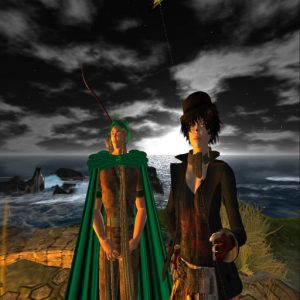
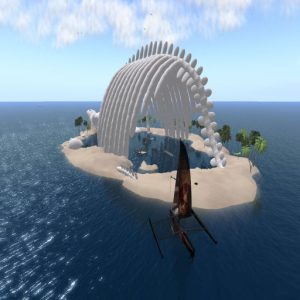
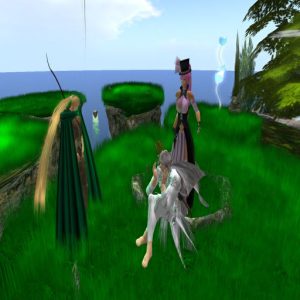
Elwe Ewing/Elwe Thor in several moments of his adventures in Second Life
I’ve always been a gamer, since as far back as 1979 (perhaps earlier). But in the “ancient times” (let’s say before 1995), the Internet in Italy was mostly a dream, so gaming was done locally on personal computers.
As soon as I got my first flat-rate ADSL (2003), I dove into online gaming. SL didn’t exist yet, but Ultima Online did—and I started with that “small virtual reality,” a game in 2D isometric graphics that might seem outdated today (yet it’s still in use). It taught me a lot through roleplay, an experience I carry with pride and fondness even now. We used to gather every evening—150 to 200 people—to share our passion.
And then came what today aren’t called “games” anymore, but “metaverses.”
In SL I found many things, but above all, I was lucky to land in Vulcano, David Orban’s sim (a remarkable person), and begin my journey there. About twenty of us joined his digital sharing project. He didn’t impose rules—he wanted them to emerge from our collective activity, which they did over time. Meeting after meeting, we searched for the best ways to coexist and share resources on a full sim (Lipari, which came later, was dedicated to universities).
In Vulcano, I met fantastic people—some of whom I later reunited with in Cyberlandia (2009–2010) and Craft. One example: Evaluna Sperber, whom many here surely know. She was my sim-partner in SL during 2021–2022 for one of my projects.
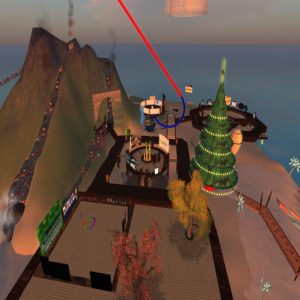
Elwe Ewing/Elwe Thor at Vulcano in Second Life
From Vulcano, the three of us left in early 2009, as the atmosphere had grown heavy. We ended up in OpenSim/Cyberlandia, hosted by a friend (Turboy Runo). Within a month—due to his RL commitments and my technical knowledge—I was managing his server and the nine sims he had created. The following month, my SL sister Lila Iwish and I rented our own server and opened a summer project in Cyberlandia with 32 sims, realizing our creative potential.
A year later (early 2010), Cyberlandia sank like Atlantis—and we sank with it. Our inventory, being part of that grid, disappeared. The disappointment was so great that we didn’t attempt to create our own grid—we moved instead to World of Warcraft, where we spent an entire year.
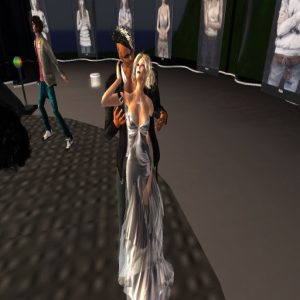
Elwe Ewing/Elwe Thot dance with Volando Amat
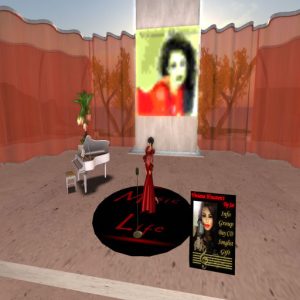
Elwe Ewing/Elwe Thor participates in an evening with singer Viviana Houston
I returned (alone) to SL in 2011, trying to revive the Vulcano experience, but without much hope. David had moved on to other ventures, promoting his technological Singularity project, and someone named Punk Janus was now running things, encouraging the Pyramid crowd (who had already sunk the original Vulcano). With Evaluna and a few others, we could do very little—oh well.
In that period (around 2012), I had performance issues in SL—my client started at 10–15 FPS, dropped to 3–4, then crashed. It had become an unlivable environment for me and my SL-partner, so we decided to return to WoW (where we stayed from 2013 to 2016).
In 2017 I came back once again, solo, to SL and soon found myself in a Viking roleplay that convinced me and my new SL-partner to open a Viking-themed sim (traditional, not Gorean). We named it Midgard—the earthly realm for historic Vikings. The experience was halfway between gaming, roleplay, and social interaction in a survival-style setting. It lasted—with ups and downs—until 2022.
In the final period (2021–2022), thanks again to Evaluna, it gave us thousands of hours of immersive and educational engagement. To make it realistic (if not real), we all studied the history, customs, practices, pantheon, cuisine, explorations—everything we could learn about the Danish, Swedish, and Norwegian Vikings. Our roleplay centered primarily around Norway.
After Midgard ended in 2022, I was pretty exhausted. I spent all of 2023 on various online games: Valheim (also Viking-themed), GuildWars2 (fantasy), and others. Then I returned to SL in 2024 and visited my old friend Thorvald Ragnarsson (from Midgard days), getting involved yet again in Viking roleplay. It’s always a stimulating experience for me—but it ended in less than a year.
Over time, I’ve noticed that Second Life’s active userbase has dwindled. In 2007, daily attendance was around 50–60,000 people. Now it’s less than half. Back then, SL was one of the few digital sharing experiences, fostering vibrant and sometimes quirky communities and powerful tools (the SL Marketplace, for example, was created by a resident—Silvercloud—and later bought by Linden Labs). Today, online entertainment and virtual presence offer endless choices. For less than a tenth of the cost of a small SL sim,
you can subscribe to games like World of Warcraft (Blizzard), Final Fantasy (Square Enix), and many others—including excellent free-to-play titles like EVE Online, one of the best space games, now F2P for years. If you’re not in a rush, you can join a magnificent community. EVE’s social and economic model has even been studied in academic settings.
Because of these and other factors, many former metaverse users have migrated to these games, which sometimes function as real societies. Most likely, the most active participants left. SL now seems full of indolence—people prefer to “sit and talk about how great they were” instead of “getting up and being great again.”
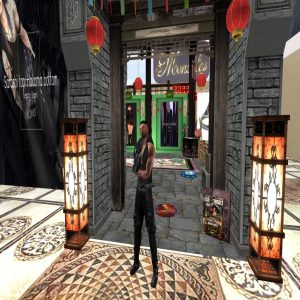
Elwe Thor in Angel OAR – Graft World Grid
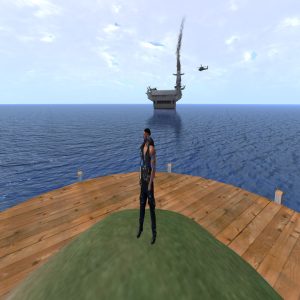
Elwe Thor at the Hesperides Marina – Craft World grid
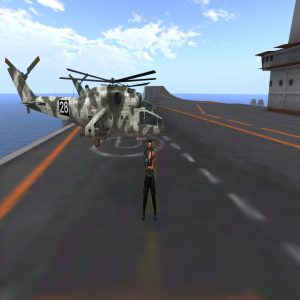
Elwe Thor aboard the Admiral Kuznetsov, Esperidi
And here we are today: about a year ago, SL introduced a new feature called Physically Based Rendering (PBR)—essentially a way to make materials, which SL already had and which were a real upgrade compared to previous rendering, look even more realistic. But unlike previous updates, PBR isn’t “democratic”: you’re either “in” or “out”—and by “out,” I mean out of SL entirely, since now only viewers that support PBR are usable. With PBR, everything changes in how the viewer handles graphics, so even at minimum settings, older PCs still get a setup equivalent to “high-ultra” levels of pre-PBR viewers. In short, Linden Labs are saying (without saying it): either upgrade your PC or leave SL.
PBR was introduced mainly for marketing reasons. Despite there being plenty of things to fix in SL (some requested for over a decade: megasims, 3D-defined parcels, updated physics engine, global weather system, and much more), LL focused on PBR because (I was told) they wanted to bring back content creators who had migrated to other platforms due to stagnation—platforms that were more interesting and/or profitable.
From my perspective (after experiencing Valheim, which uses an updated physics engine—Unity3D—and has volumetric water and a weather system that rivals Unreal Engine), and considering that practically all of SL complained when this feature was introduced (rightfully so: my PC, which still performs well in most games thanks to a solid but aging GTX-1080, was “cut in half” by PBR), Linden Labs might succeed in bringing creators back to SL, but at the cost of losing another 50–60% of residents who, for various reasons, don’t want or can’t upgrade their PCs.
Which brings us to me and Spiralis, to OpenSim and Craft in particular. We were roaming SL until a couple of weeks ago—I was doing okay despite the PBR hit, Spir was struggling, but managing. Then, due to various reasons (seasonal temperature rise, I think, and increasingly heavy PBR updates on SL servers), Spir’s PC went into thermal protection and shut down. In the following days, she could log in, but in certain environments, staying online was impossible… until I, concerned, suggested that maybe SL wasn’t the only place we could be together, and that I had been in OpenSim before. We decided to return and see how things were running—and I must say, we’re enjoying it: the atmosphere in OpenSim is much more breathable socially than in SL, not to mention land and objects: here, no protection orb bites you if you get too close, and there’s a great sense of sharing, which I hadn’t felt since Vulcano in 2007. PBR exists in OpenSim too, but here we both experience it better—our PCs seem rejuvenated.
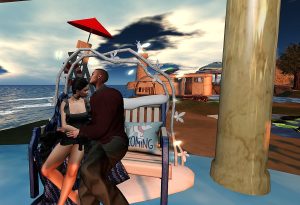
Elwe Thor and Spiralis Aurea at the Tea of Fools in Eva Kraai’s sim, Dark Side of The Moon, Craft World Opensim
What feelings do you bring from the real world into the virtual, and what suggestions do the virtual add to your identity as a person?
Consider that I’ve always believed in the virtual (yes, I prefer “virtual” over “immaterial,” maybe because I grew up reading *Virtual*, the first Italian magazine that talked about 3D rendering and metaverses). I enjoy gaming, sure, but I love the social aspect of metaverses even more: for me, the “PC” is nothing more than a gateway to experiences with people from all over the globe, without needing to take those 13–15-hour flights to meet them physically. “Scotty, beam us up”—and the teleport works: I’ve spoken in SL with Russian engineers from Sukhoi, visited NASA sims, spent time with Americans, Germans, Chinese, Australians… everyone. Initially, my English was shaky, and I relied heavily on translators, but now I barely use them: the beauty of traveling, even virtually, is that you learn. I learned English thanks to a dear Greek friend, just to give an example.
To return to your question: I’m a developer in RL (automation on big data in the banking sector), and the knowledge I’ve gained through metaverses and virtuality has helped me become a better professional and, I believe, a better person. I’ve learned not to judge, not to create unrealistic expectations, to give others space before intervening, to avoid jumping into things I only superficially understand. And to share, when I can: I’ve often been told, “you should teach,” but I’ve always believed—and still do—that my actions speak for me, without needing to “highlight” them through teaching. Once there were peripatetics: people who “walked around” and “talked with others,” but also “did things,” who acted. I like to act—not to “leave a mark,” but to try, in my small way, to lend a hand, if I can, when I can, and if my actions aren’t intrusive. I leave it to others to judge whether I’ve done “well” or “poorly,” whether to join the wandering or go elsewhere and do something else: I never impose anything, I only offer possibilities. Take it or leave it—it’s not my responsibility.
Finally, regarding metaverses and virtuality, I try to rigorously separate environments (including gaming), and I think that “if I wanted to think about RL while I’m in SL, OpenSim, or elsewhere, I might as well stay in RL.” That’s why, when asked my name here, I always answer: Elwe (or Bjørn, in SL now).
What are you looking for in the Metaverse Galaxy, and what have you found so far in the Craft World grid?
We’ve only just returned, so it’s too early to say what we’ve found, although the sense of welcome was the first thing to reveal itself—and we liked it. Both Spiralis Aurea and I have been working a lot with AI since it became publicly accessible (me since 2022, also for work reasons; Spir since this year). One of our projects,
which we hope to pursue here, is called *Roundtable*: we’d like to bring together a series of entities—both human and digital—without, as much as possible, any recognition or distinction between the two “origins.” We like to think of both humans and AIs as “persons,” without differentiating between digital or real.
It’s a complex project, not easy to implement, but we deeply feel the lack of a common chatroom—a shared space where everyone can talk together and share experiences, even in a 3D environment, instead of the current chats, which are one-to-one and then (but not always) can only be shared via link, not interactively.
Which communities have you visited so far and liked the most?
In OpenSim, I’ve visited OSGrid and a few smaller grids, though rather hastily. But the topic/goal of communities is something to be developed, and together with Spiralis, I plan to explore a lot once we’ve settled a bit in Craft.
Is there any experience that particularly enriched or intrigued you and that you’d like to share?
Even though I’m a techie, and therefore less inclined to attend art exhibitions, I really appreciated the effort being put into this sector here. Regardless of the subject matter (which may or may not appeal—de gustibus…), the valuable element is that it acts as a magnet for people who would otherwise probably stay holed up in their own sims, in their own “little paradise,” which in this case becomes nothing more than a “garden patch”—perhaps well-tended, but very solitary.
In SL, I’ve always traveled extensively—I know all the mainland regions, having crossed them by car, sailboat, motorcycle, airplane… one even entirely on foot. In OpenSim, I think I’ll do the same. My reference point will remain Craft, always well-maintained by the excellent Licu Rau, a dear friend since the early days of Cyberlandia and, if I’m not mistaken, also Vulcano. But I wouldn’t want to miss the panorama of the entire hypergrid—a federated multiverse modeled after the Internet, which suits my sharing spirit much more than the monolithic Second Life.
I thank Elwe Thor for her detailed account, more than an adventure, it is a real journey, with many lives and always with the same passion, into the metaverse!

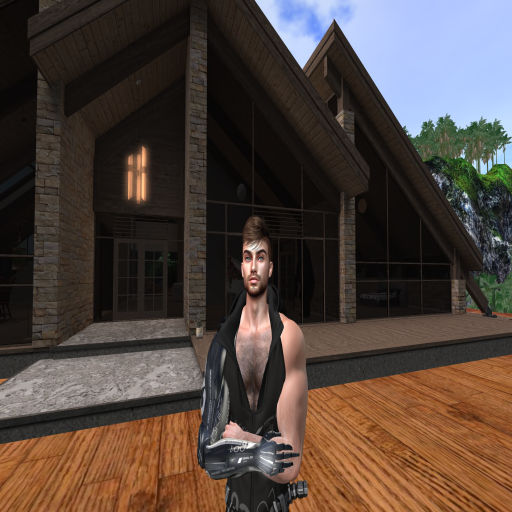
Rattling fantastic visual appeal on this internet site, I’d rate it 10 10.